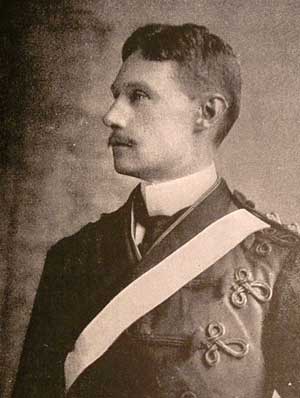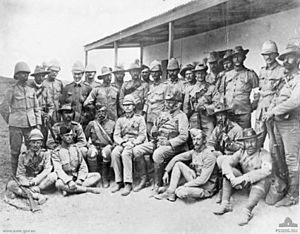Thomas Pilcher facts for kids
Quick facts for kids
Thomas David Pilcher
|
|
|---|---|

Pilcher, photographed in South Africa c. 1900
|
|
| Born | 8 July 1858 |
| Died | 14 December 1928 (aged 70) |
| Allegiance | |
| Service/ |
|
| Rank | Major-General |
| Commands held | 2nd Bn Bedfordshire Regiment Bangalore Brigade Burma Division 17th (Northern) Division |
| Battles/wars | Second Boer War First World War |
Major-General Thomas David Pilcher (born July 8, 1858 – died December 14, 1928) was a British Army officer. He led a special mounted infantry unit during the Second Boer War. Later, he commanded the 17th (Northern) Division in the First World War. However, he was removed from his command during the Battle of the Somme.
Pilcher started his army career as an infantry officer. He first saw action in Nigeria in the late 1890s. Then, he fought in the Second Boer War (1899–1902). After this war, he wrote a book about what he learned. He later held important positions in India.
Pilcher was very interested in the German army. He studied their methods and wrote books about new military ideas. Some of his ideas were quite controversial. He even wrote a secret novel about a German invasion of Britain.
When the First World War began, Pilcher was in England. He was given command of the 17th (Northern) Division. This was a new volunteer unit. During the Battle of the Somme in July 1916, Pilcher disagreed with his commanders. He believed attacking without proper planning would cause many deaths. After ten days of fighting, he was removed from his role. He then commanded a reserve center in England. He wrote more books before retiring in 1919.
Contents
Early Military Life
Thomas Pilcher was born in Rome in 1858. His father was Thomas Webb Pilcher. Thomas was the oldest of five children. His younger brother, Percy Pilcher, became a famous engineer who helped build early aircraft. Their sister, Ella Pilcher, helped with the fabric for the aircraft wings.
Pilcher went to Harrow School. After his father died in 1874, he left school at age 17. His mother moved the family to Germany to save money. She died there in 1877. Thomas brought his younger siblings home. He joined the Army in 1878. He quickly moved to the 22nd Regiment of Foot, then to the 5th Fusiliers.
After some time, Pilcher attended the Staff College, Camberley. He finished the course in 1892. From 1895 to 1897, he worked as a deputy assistant adjutant-general in Dublin. He then went to West Africa in the late 1890s. There, he helped create a battalion of the West African Frontier Force. He also led an expedition to Lapai and Argeyah.
In 1899, Pilcher joined the Bedfordshire Regiment. He took command of the 2nd Battalion. This unit fought in the Second Boer War from 1899 to 1902. During this war, Pilcher also led a group of mounted infantry. This group included many Australian soldiers. He was promoted to lieutenant-colonel in 1900. He became a colonel later that year. In 1901, he became an aide-de-camp to King Edward VII.
After the war, Pilcher returned to the United Kingdom in 1902. He was given the award of Companion of the Order of the Bath (CB). King Edward VII presented him with this award. He commanded brigades in Aldershot from 1902 to 1907. Then, he was sent to India. There, he held several commands. His highest position was leading the Burma Division from 1912 to 1914. This made him the most senior military officer in Burma.
A Military Thinker and Writer
Pilcher was very interested in military strategy. He closely watched the German army. He studied their methods and even attended their army exercises. He later translated a book by the famous military writer Clausewitz.
Pilcher also wrote his own books. His writing sometimes caused debate. In 1896, he wrote Artillery from an Infantry Officer's Point of View. In this book, he strongly supported using indirect fire for artillery. This meant firing from hidden spots. At the time, many believed artillery should fire directly at targets. This argument lasted for two years.
His writings also affected his career. In 1907, he wrote a pamphlet called Fire Problems. In it, he pushed for more use of machine-guns. He wanted them used in larger numbers and with new tactics. This was an unusual idea before the war. Because of his writings, he was twice blocked from promotion by the Commander-in-Chief India.
In 1906, Pilcher published a novel called The Writing on the Wall. He published it anonymously, meaning no one knew he wrote it. The book described a German invasion of Britain. He wrote about how British forces might quickly collapse. He believed volunteer soldiers were not ready for war. He suggested that Britain should have a form of conscription. This would make the army stronger. The book was even translated and published in Germany.
First World War Service
When the First World War started in August 1914, Pilcher was on leave in England. He offered to serve, but was first turned down. However, in January 1915, he was given command of the new 17th (Northern) Division. This division was part of Kitchener's Army. Its soldiers mostly came from northern England.
The division moved to France in July 1915. It held a section of the front line near Ypres. In March 1916, it fought in the Actions of St Eloi Craters. After this, Douglas Haig thought about removing Pilcher from command. Pilcher was not highly rated by his senior officers. But in the end, his corps commander, Hew Fanshawe, was removed instead.
Many people thought Pilcher was old-fashioned. He rarely visited the trenches. A journalist named Philip Gibbs said Pilcher had "courteous old-fashioned dignity." But Gibbs felt that "modern warfare was too brutal for him." An officer who joined the 17th Division in 1916 found it very disorganized. There was no central control. Basic needs like laundry were not provided for front-line units. The divisional staff seemed "of no value."
The 17th Division was sent to fight in the Battle of the Somme in July. On the first day, July 1, it helped capture Fricourt. The division lost 1,155 men killed or wounded. After this, it was involved in capturing Contalmaison and Mametz. By July 11, it had lost 4,771 soldiers.
Many of these losses came from a failed attack on July 7. Pilcher had wanted to pause and prepare for this attack. But higher command overruled him. They forced an attack that night, which failed. Then, they ordered a daylight attack on July 7. Pilcher strongly protested this. He believed it would fail and cause many deaths. He ordered the attack with the fewest men possible. This angered his superiors. Pilcher later wrote that it was easy for commanders far behind the lines to get credit for sending men to die. He said he did not like this, and his protests were not well received.
After the division was pulled back, Pilcher was quickly removed from his command. His corps commander, Henry Horne, felt he lacked "initiative, drive, and readiness." Haig simply said Pilcher was "unequal to the task." Pilcher was replaced by Philip Robertson on July 13, 1916. Pilcher was then sent to command a reserve center in England. He retired from the Army in 1919.
Later Life and Publications
After the war, Pilcher ran for Parliament in the 1918 United Kingdom general election. He ran in the Thornbury area. He was part of the National Party. He lost the election by a large margin.
He continued to be involved in some right-wing political groups. He was a member of the British Fascisti when it was formed in the early 1920s.
Pilcher died in 1928 at age 70. He passed away from pneumonia.
Pilcher published several books during his life:
- Manœuvre block (1895)
- Artillery from an Infantry Officer's Point of View (1896)
- Some Lessons from the Boer War, 1899–1902 (1903) – digital copy
- Some considerations connected with the formations of infantry in attack and defence (1906)
- The writing on the wall [published anonymously as "General Staff"] (1906)
- Fire problems (1912)
- A general's letters to his son on obtaining his commission [published anonymously] (1917) – digital copy
- A General's letters to his son on minor tactics [published anonymously as "X. Y. Z."] (1918) – digital copy
- War according to Clausewitz [edited, with commentary] (1918)
- East is East: stories of Indian life (1922) – digital copy
 | Aaron Henry |
 | T. R. M. Howard |
 | Jesse Jackson |


